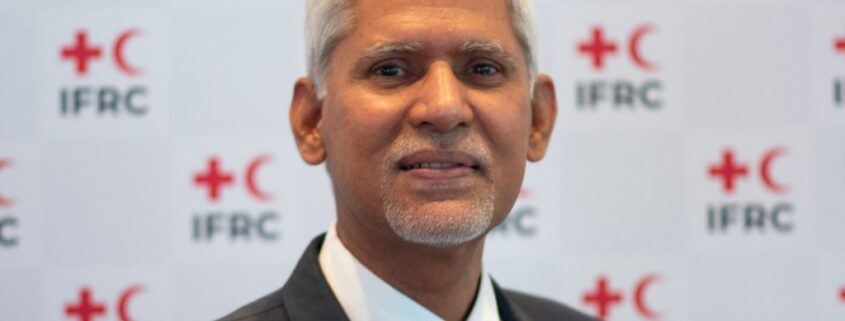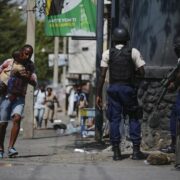The world is not ready for the next pandemic, warns the IFRC
Black Immigrant Daily News
No earthquake, drought or hurricane in recorded history has claimed more lives than the COVID-19 pandemic, according to the world’s largest disaster response network, the International Federation of Red Cross and Red Crescent Societies (IFRC).
The shocking death toll–estimated at more than 6.5 million people–has inspired the humanitarian organization to take a deep dive into how countries can prepare for the next global health emergency.
Two groundbreaking reports released by the IFRC network today, the World Disasters Report and the Everyone Counts Report, offer insights into successes and challenges over the past three years–and make recommendations for how leaders can mitigate tragedies of this magnitude in the future.
Ariel Kestens, IFRC Head of Delegation for the English and Dutch-speaking Caribbean, says:
“The COVID-19 pandemic has taught us many lessons, chief among them is that being prepared is crucial to any disaster. Many countries around the world and within this region were not ready for COVID-19. The effects of the pandemic, exacerbated by the many climate-related disasters in the region, have shown us that true preparedness means being ready for multiple simultaneous hazards.”
Jagan Chapagain, IFRC’s Secretary General, remarks:
“The COVID-19 pandemic should be a wake-up call for the global community to prepare now for the next health crisis. Our recommendations to world leaders center around building trust, tackling inequality, and leveraging local actors and communities to perform lifesaving work. The next pandemic could be just around the corner; if the experience of COVID-19 won’t quicken our steps toward preparedness, what will?”
The IFRC network across the world reached more than 1.1 billion people over the past three years to help keep them safe from the virus. During that time, a theme that emerged repeatedly was the importance of trust. When people trusted safety messages, they were willing to comply with public health measures that sometimes separated them from their loved ones in order to slow the spread of the disease and save lives. Similarly, it was only possible to vaccinate millions of people in record time when most of them trusted that the vaccines were safe and effective.
Those responding to crises cannot wait until the next time to build trust. It must be cultivated through genuinely two-way communication, proximity, and consistent support over time.
In the course of their work, Red Cross and Red Crescent teams documented how the COVID-19 pandemic both thrived on and exacerbated inequalities. Poor sanitation, overcrowding, lack of access to health and social services, and malnutrition create conditions for diseases to spread faster and further. The world must address inequitable health and socio-economic vulnerabilities far in advance of the next crisis.
In its Everyone Counts report–which surveyed National Red Cross and Red Crescent Societies from nearly every country in the world–the IFRC found that teams were able to quickly respond to the pandemic because they were already present in communities and many of them had engaged in preparedness efforts, had prior experience responding to epidemics, and were strong auxiliaries to their local authorities.
“Community-based organizations are an integral part of pandemic preparedness and response. Local actors and communities, as frontline responders, have distinct but equally important roles to play in all phases of disease outbreak management. Their local knowledge needs to be leveraged for greater trust, access, and resilience,” states Mr. Chapagain.
“It has been a brutal three years, but we are releasing this research and making recommendations in an act of hope: The global community can learn lessons and do justice to this tragedy by being better prepared for future health emergencies.”
The World Disasters Report offers six essential actions to prepare more effectively for future public health emergencies. The Everyone Counts Report highlights the need for accurate and relevant data in pandemic preparedness and response. Both are available to practitioners, leaders, and the public.
According to WHO, 43% of all COVID-19 related deaths worldwide have occurred in the Americas, with the Latin America and Caribbean region having the highest number of deaths per million inhabitants on average: 3,000 deaths per million.
Since the onset of the pandemic, the IFRC network in the Caribbean has conducted several activities in response to the pandemic including risk communication, community engagement, health and hygiene promotion, water and sanitation, and food and cash assistance. Local Red Cross teams will continue to work as auxiliaries to the authorities, promoting equitable access to vaccines and activities to build vaccine confidence, socio-economic recovery efforts for the most vulnerable, and placing communities at the center of its actions through locally led humanitarian support.
Donate At Caribbean News Service, we do not charge for our content and we want to keep it that way. We are seeking support from individuals and organisations so we can continue our work & develop CNS further.
NewsAmericasNow.com











Leave a Reply
Want to join the discussion?Feel free to contribute!